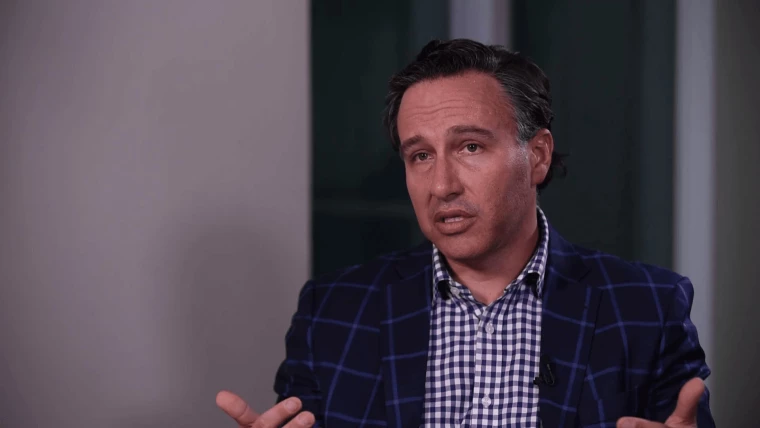About the Episode
As the travel industry slowly awakens from the pandemic-induced slumber, airlines, hotel chains, and cruise lines face a highly uncertain and volatile future in which the past is unlikely prologue. Jason Guggenheim, BCG’s global leader of travel and tourism, explains that these companies can sharpen their ability to sense subtle shifts in demand. Will business travel, for example, ever fully return? Leaders in the industry, especially airline and cruise line executives, are facing mounting calls to forcefully address climate change.
Episode Guest
Episode Transcript
[MUSIC PLAYING]
GEORGIE FROST: There aren't many businesses or industries that have gone through the pandemic unscathed or unchanged, but there is one that's been continually buffeted by COVID and whose future looks more uncertain than most. What will the lasting impact be on the travel industry, and what do leaders need to do in the face of such volatility to ensure their businesses not only survive, but thrive? I'm Georgie Frost, and this is The So What from BCG.
JASON GUGGENHEIM: Consumer behavior is one that I think will shift and has shifted. And then I think a use and a willingness to use technology to disrupt their own models and processes to get better, quicker, more reactive.
GEORGIE: Today, I'm talking to Jason Guggenheim, global leader of travel and tourism at BCG.
JASON: Historically, many companies, including travel companies have used history as a guide to the future. So what did the previous three years look like, the previous five years? And within reason, you could leverage that as a means to plan, what do the coming year or two or three probably look like. And I think what COVID has done is created a world in which you can't rely. History is no longer necessarily a lens to the future.
GEORGIE: Which of course leads me on to the question, Jason, of how do you as a business leader predict the future with such volatility and just explain to me the importance of doing so, the short,- the medium-, and the long -term.
JASON: Yeah. Many travel players, not all but many are still quite fixed capacity, very asset-intensive businesses, whether it's land and buildings, in the case of hotels and resorts, airplanes, cruise ships, etc.
I think in terms of the need to do that more long term, so if you move beyond medium term and say where do I think we'll be in three years or five years, I mean, those are obviously really hard questions given just the volatility in the short term. And sometimes we are seeing that short-term volatility actually in some ways being quite crippling of executives' willingness to look three or five years out because it is so uncertain today and tomorrow. But again, I think executives have a duty and onus to drive value. And so I think thinking through business models that will be more resilient to this type of volatility, the next, who knows what that will be, pandemic, etc. There's just an onus to think both in the short term to survive, but also in the long term to ensure that their business models are resilient enough to thrive in whatever gets thrown at them.
GEORGIE: I'm wondering whether many of the patterns of change to the industry that we're seeing now were already put in motion, already set and likely to continue after this disruption. That's in no way seeking to minimize the impact of coronavirus. I'm just curious about how fundamental some of the changes have actually been as a result of coronavirus.
JASON: I think some of the patterns were set. And look, I think some will probably continue. And one of the things also, it was interesting when you started to see the results of COVID show up in travel, you saw very different outcomes starting to emerge across the world. For example, you saw Europe was much slower to come back and has been slower, where domestic US certainly on the leisure side is pretty much back to where it in 2019. Some of those patterns will come back. Some models that relied on types of travel that have been more affected, more threatened, more reliant on cross border, etc., I think maybe slower or may come back in a different form. People will choose alternative behaviors, right? Whether it's video, whether it's hybrid, whether it's train, etc. And so I do think there are some adjustments into how businesses will be run.
The So What from BCG Podcast
GEORGIE: Coronavirus is of course incredibly impactful. We've seen the impact of it already. It won't be the only factor and hasn't actually been over the last couple of years the only factor in influencing this industry. It's important not, I guess, to be blindsided by it and forget everything else. Climate change of course is the one thing that I'm thinking about here and one of the biggest ways, of course, that we can reduce our carbon footprint is to stop flying.
JASON: Yeah.
GEORGIE: You spoke about predicting the future, but before I get you to tell me ways in which you can do that using data and technology and building resilience, I want you to tell me what you think, crystal ball gaze now, what you think the future of this industry will look like. Let's say I'm the CEO of a travel firm. I come to you. I want to know what I should be doing, what will my consumers want in the future.
JASON: Yeah. Let me maybe take that from two different angles. So one is the consumer, as you mentioned. Then I think the other pillar around which I would build a prediction of the future would be technology. And so let me take consumer first. I think there is going to be a huge onus on travel companies to truly understand behavior going forward. We're all working differently; hybrid models, flex models, people in offices certain days of the week, at home other days of the week. It's going to fundamentally disrupt our travel patterns. It also has and will I think fundamentally disrupt the way we take vacation. More shorter trips, more trips that are combined work and leisure, more trips where I may be socializing with my coworkers as opposed to actually only meeting with my coworkers at meetings and events, etc.
GEORGIE: Do you really think that's the case now that we're in the Zoom era? Why do we need to make those business trips anymore?
JASON: Yeah. So when we do research and talk to executives, but also talk to leaders of companies, travel managers and companies, we see a few things. One, culture, human connection amongst employees is still a critical part of collaboration. People want to know who they're working with. And yes, you can get to know somebody, so to speak, over technology platforms, but really you don't create the sort of bond and trust in many cases that you do when you're at an event team building, training, etc., where you're live in a room and you're having the proverbial water cooler conversations about what you did that weekend. A lot of that disappears on Zoom, right?
Zoom is incredibly efficient, but it's not very effective at building bonds and relationships amongst people. I think we also see when you talk to leaders that their belief is, and I think you're even starting to see this now in travel behavior, you will not replace the connection between, let's say somebody selling something and somebody buying something, those client relationships in whatever form they take, right?
fSo I think that's part of the onus on travel companies is to try and understand how that affects their product, the way they market, the way they price, the way loyalty programs recognize those who used to travel maybe 50 weeks a year and no longer will, but that doesn't mean they're no longer the most loyal. And so how do you adjust a lot of the things that you have within your business? There had been a lot of talk and there has been a lot of talk about data, big data, AI and the use of it.
I think in travel, one of the things that I've seen both amongst my clients, but more broadly amongst the companies we spend time with is an acceleration of how companies are using and looking to leverage advanced analytics and data to in some ways predict or sense the future, whether that's looking for signals from consumers that help them better predict who's going to show up on a website to book or taking what used to be robust processes, so to speak, like the long tent poles in the business model, it may take me three months or six months to sort of, in an airlines example, build a network, schedule, assign the fleet, get the crew assigned. But in a world of volatility, I may need to learn how do I do that now instead of in 180 days in 15 days. And so you're seeing technology combined with humans really try and dramatically reduce the time taken for what were historically in some cases, very long, very manual, very linear processes in big complex operations.
And so I think if I had to sort of think about the future, consumer behavior is one that I think will shift and has shifted. And then I think a use and
One thing COVID taught us is that we like to be places instead of being at home stuck. We like to move, we like to meet people.
GEORGIE: Human brute force?
JASON: So if a change happens, historically it took a lot of just human hands to push that change through the business, right? Whether that meant repositioning aircraft, repositioning ships, etc. I think now with the use of technology become less reliant on a lot of people making things happen and some combination of technology and people to make it happen more quickly. And in many cases more accurately, right? Faster and more accurately.
GEORGIE: On that theme, the companies that seem to have been the most successful during the pandemic are those that have been able to pivot their business models, be flexible, adaptable, move quickly, find opportunity perhaps where they hadn't looked in the past. A really simple example perhaps would be, I don't know, a beer company that makes hand sanitizer. For many in the travel industry, and I'm thinking big airlines, for example, where do you see their space for that sort of adaption? They seem so linear and not just linear, they work within an ecosystem that is large and seemingly so immovable. How do you square that circle?
JASON: Yeah. That's the billion- or trillion-dollar question that many of them are asking. I think some of it will start as we were talking, with innovating and being willing to sort of really change some historic ways of working and processes and challenge the way things are done in order to get faster and more agile, that both allows them to take costs out, maybe make costs more variable than it had historically been, which allows them then to react to changes that happen just with more agility, right? Less fixed cost and more agile. I think some of it is also going to require executive teams to think differently about value and where does value come from? Obviously, in many of these businesses, there are still going to fly people or sail people around put people into beds, but
And so I think you'll see some creativity around business models that could emerge maybe initially as adjacencies to the core travel business. A great example of this is Qantas down in Australia, not driven by COVID, but driven by other sort of threats to their existence from other competitive entrants, etc., went down a path of creating a data business, a loyalty business that really had a robust currency. They pivoted that into a health care insurance business based on the data and customer set. And so they thought differently. They thought about assets beyond just a steel tube and a network. And so I think hopefully those that are innovative will look to do more things like that to find pools of value that historically hadn't been tapped within the business.
GEORGIE: Where do you think collaboration will fit in in the future? With that, I mean, companies that work within the same space, perhaps two airlines, as well as those companies that work within complementary areas such as hotels, airlines, insurance firms.
JASON: Yeah. I think that's a great question. I mean, over history, you've seen collaboration often become the key to solving some really big industry challenges. So over the arc of my career, if you go back, one of the early things I worked on was Orbitz, right? A collaboration between the major airlines in the US back over 20 years ago in creating an online web-based distribution challenger to the others, Expedia and at the time Travelocity. And so I think collaboration can certainly play a role when any individual player, whether it's airline or other on their own was unlikely to solve or really make a dent in that problem. I think more recently you've seen ACT come into being with two plus global airlines or aviation climate task force where we as BCG were sort of instrumental in coalescing airlines to collaborate on sustainability, alternative fuels. Our view is no individual airline will solve this on their own. There's very little, if any, competitive advantage for one airline solving it and not the other. It's a global problem, it's a problem of humanity, and so why not collaborate? Ten or 15 or 20 or 25 airlines working together to fund technology and innovation, alternative fuels regulation, is far more powerful than all of them trying to do it individually, sometimes pushing in the same direction, but sometimes pushing in 20 different directions.
So I do think there is a role for collaboration in solving some of the structural and other problems that exist in the industry. Another example is four or five years ago, we had a thesis that there was a better ability for data to flow across people's travel journey. And so today your airline data doesn't talk to your hotel booking, doesn't talk to your car rental booking. And so we helped with some partners sort of create a business by the name of Journera that really looked to create a safe, well-governed data platform that travel players—hotel, air, and others—could plug into in order to better serve their customers by knowing more of out their travel journey to knowing that I was going to get on a plane, but then I had a hotel on the other side. And so should I get disrupted, why not let the hotel know that I'm actually not going to arrive when I was meant to arrive? And so I do think there is a role for collaboration, for sure.
GEORGIE: Is the future bright for the travel industry?
JASON: Yeah. I think there's opportunity. I think the opportunity is finding those green shoots, those places where the consumer is going to be optimistic. I think leaning into leisure, finding opportunities for how the new business model, like how new businesses will meet and gather. I think it's probably too early to say it's bright. I think there's opportunity. I think there is still more strain to come, right? As the latest variant showed us and the numbers very quickly dwindled, those flowing through airports. But yeah, I think, look,
GEORGIE: Jason, thank you so much, and you for listening. We'd love to know your thoughts. To get in contact, leave us a message at thesowhat@bcg.com. And if you like this podcast, why not hit subscribe and leave a rating wherever you found us. It helps other people find us too.
BCG’s Insights on Travel and Tourism
BCG’s Insights on Travel and Tourism







